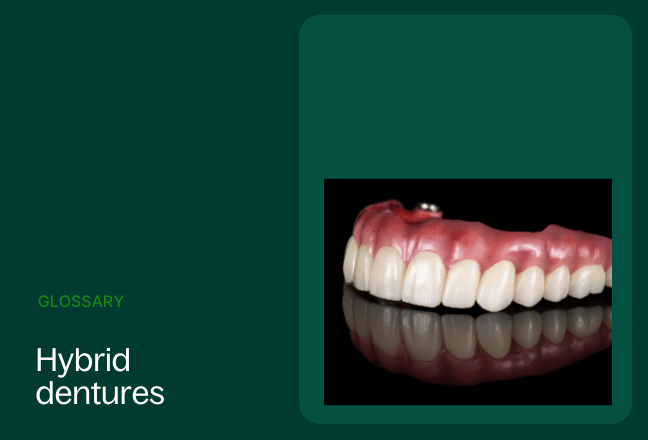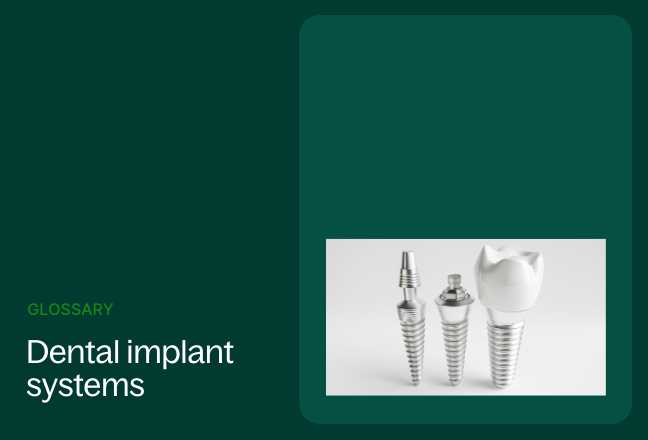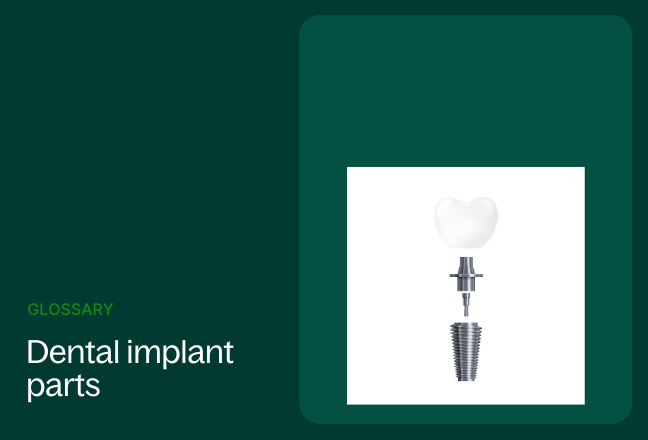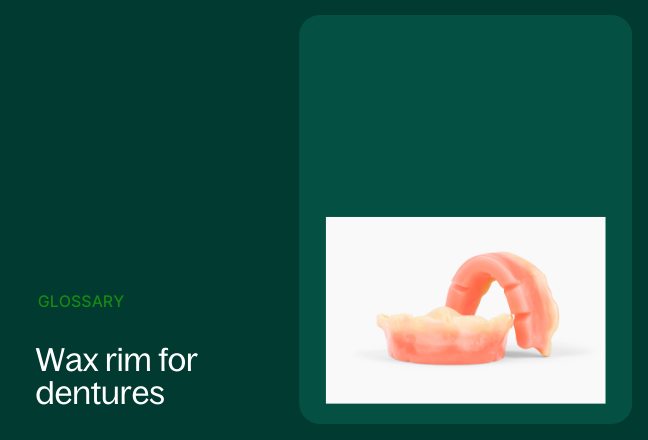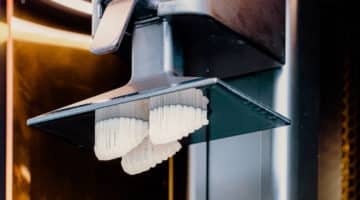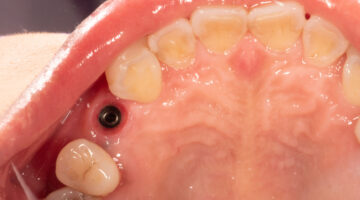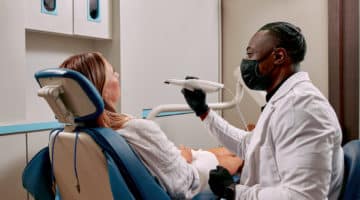Hybrid dentures are a type of dental prosthesis that combines the stability and support of dental implants with the affordability and removability of traditional dentures. They are a good option for patients who have lost all of their teeth in one or both arches and who are looking for a more secure and natural-looking alternative to traditional dentures.
Sometimes hybrid dentures are referred to as “All-on-4,” a reference to the (usually) four implanted pillars the dentures sit upon. These four implants are strategically placed in the jawbone, with two in the front and two in the back. This placement allows the implants to support a full arch of teeth, even if there is not enough bone for traditional implants. The number of implants can vary from two to six, but “All-on-4” is a catchy moniker, so it has become commonplace.
Pros and cons of hybrid dentures
Like all dental procedures, there are a lot of different factors to consider before choosing which one is right for the patient. Let’s go over all of the pros and cons associated with hybrid dentures.
The pros of hybrid dentures
- Improved stability and support: Hybrid dentures are anchored to dental implants, providing significantly greater stability compared to traditional dentures. This allows the patient to eat, speak, and laugh confidently without worrying about the dentures slipping or falling out.
- Enhanced chewing function: The improved stability of hybrid dentures allows for more effective chewing, leading to improved digestion and a better overall eating experience.
- Natural-looking appearance: High-quality hybrid dentures are crafted to closely resemble natural teeth, offering a more natural and aesthetically pleasing appearance than traditional dentures.
- Improved oral health: Hybrid dentures can help prevent bone loss in the jaw, a common concern with traditional dentures. This is because the implants stimulate the jawbone, promoting its health and density.
- Reduced risk of gum irritation: Unlike traditional dentures, which can irritate the gums due to friction, hybrid dentures distribute pressure more evenly, reducing the risk of irritation.
- Easier cleaning: Hybrid dentures can be easily removed for cleaning, allowing for more thorough and effective cleaning compared to traditional dentures.
The cons of hybrid dentures
- Higher cost: All-in hybrid dentures are significantly more expensive than traditional dentures due to the additional cost of dental implants and the more complex fabrication process.
- Surgical procedure required: Placing dental implants involves surgery, which requires healing time and carries certain risks associated with any surgical procedure.
- Longer treatment time: Compared to traditional dentures, the process of getting hybrid dentures typically takes longer due to the surgical procedure and the time required for the implants to heal.
- Maintenance requirements: While hybrid dentures are easier to clean than traditional dentures, they still require regular brushing, flossing, and professional cleanings to maintain their appearance and function.
- Not suitable for everyone: Certain medical conditions or bone health issues may make individuals ineligible for dental implants, thus disqualifying them for hybrid dentures.
The hybrid dentures workflow
The process of installing hybrid dentures typically involves multiple appointments spread over several months. Here’s a breakdown of each appointment and what to expect:
Appointment 1: Consultation and planning
- Consultation: Being with a discussion of the patient’s dental history, expectations, and concerns.
- Examination: Then you will examine the patient’s teeth and gums to assess their suitability for hybrid dentures.
- X-rays and scans: These tools will help determine the amount of bone available for implant placement.
- Planning: Based on the assessment, you will develop a personalized treatment plan, including the number and location of implants needed, the type of hybrid denture, and the estimated timeline.
- Financial discussion: Please do discuss the costs involved and payment options before beginning work.
Appointment 2: Implant placement
- Surgery: The dentist or oral surgeon will place the dental implants in the jawbone.
- Healing time: Following implant placement, several months are required for the bone to heal and integrate with the implants.
- Temporary restoration: In some cases, temporary dentures may be provided to wear during the healing period.
Appointment 3: Impression and bite registration
- Impressions: After the healing period, the dentist will take impressions of the patient’s mouth and jaw to create a custom-made hybrid denture.
- Bite registration: This will record the correct bite position for optimal chewing function and aesthetics.
Appointment 4: Denture fitting and adjustments
- Initial fitting: The dentist will place the custom-made hybrid denture and check for fit, comfort, and function.
- Adjustments: Minor adjustments may be needed to ensure a perfect fit and address any concerns.
- Instructions and care: You will provide instructions on how the patient should care for hybrid dentures and schedule follow-up appointments.
The overall timeline for installing hybrid dentures can vary depending on individual needs and healing abilities. However, it typically takes four-nine months from the initial consultation to the final denture placement.
Materials used for hybrid dentures
Like with many dental procedures, there are a variety of different materials available for constructing hybrid dentures. Each different method has its own set of pros and cons.
Acrylic with titanium
Acrylic with titanium hybrid dentures are a popular choice for patients who are missing teeth and want a more stable and natural-looking alternative to traditional dentures. These dentures combine the affordability and ease of use of acrylic with the strength and durability of titanium. They are a particularly good choice for people with limited bone support and are easy to care for. However, they may not be as natural-looking as other options and may need to be replaced more often.
Composite
This form of hybrid dentures features a composite base made of a mixture of acrylic resin and fibers. Typically these fibers are made of materials such as glass, carbon, or aramid. The composite material can be custom-colored to match a patient’s existing teeth. Composite hybrid dentures are a good option for people who want a strong, durable, and natural-looking denture that is comfortable to wear. They are a good choice for patients with allergies to nickel and can be repaired easily. However, they are more expensive than traditional dentures and may not be as readily available.
PFM
Porcelain-fused-to-metal (PFM) hybrid dentures offer a unique blend of strength, durability, and aesthetics. Porcelain provides superior aesthetics compared to other materials, so PFM dentures are especially popular among patients hoping to have a natural-looking smile. The metal framework of PFM hybrid dentures gives them superior strength and durability. This is one of the more costly options.
Milled zirconia
Milled zirconia hybrid dentures, also known as monolithic zirconia dentures, are a cutting-edge solution for individuals seeking a strong, natural-looking, and long-lasting alternative to traditional dentures. These dentures are crafted from a single block of high-quality zirconia, a ceramic material known for its exceptional strength, biocompatibility, and aesthetic properties. The entire structure is milled using computer-aided design and manufacturing (CAD/CAM) technology, ensuring a precise fit and customized appearance.
How long do hybrid dentures last?
The longevity of hybrid dentures is dependent on two key factors: the material they are created with and how well they are taken care of. Different materials are more durable than others, which can shorten their lifespan. For example, acrylic hybrid dentures typically last from five-seven years, while PFM or milled zirconia hybrid dentures can last 10-15 years or even longer.
Regardless of the material used in the hybrid denture implants, maintaining proper care and maintenance, including regular brushing, flossing, and professional cleanings will significantly extend the lifespan of the dentures. Avoiding hard foods and chewing habits that damage the dentures will also go a long way to maintaining a long life out of the hybrid dentures. It also can’t be understated how important craftsmanship and a properly aligned bite are to the long-term success of hybrid dentures.
What is the survival rate for All-on-4?
The survival rate for All-on-4 implant systems is quite high, with most studies indicating success rates exceeding 90% over several years. In the short-term, studies have shown a survival rate of 99.8% after 24 months. In the long-term, research has found a success rate of 98.1% after five years and 94.8% after 10.
Hybrid dentures are a great long term solution for some patients. We hope this helps dental professionals make more informed decisions when prescribing fixed restoratives to their patients and helps patients identify the procedures they need for their specific case.
